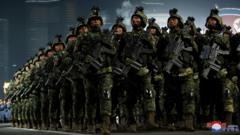Former North Korean soldiers, now defectors, are shedding light on the realities faced by North Korean troops reportedly fighting alongside Russian forces in the ongoing war against Ukraine, particularly in the Kursk region. The situation has drawn significant attention, especially given reports from the US and Ukraine stating that these troops are actively engaged in combat, which has allegedly resulted in casualties.
Among the defectors, one named Haneul vividly recalls the harsh conditions of military life in North Korea, primarily characterized by chronic malnutrition and inadequate food supplies. During his service, he lost a substantial amount of weight due to a meager diet consisting of cracked corn and spoiled vegetables, leading to severe malnutrition among his battalion members. While later postings provided better food options, soldiers often received rations that were diluted or misappropriated, contributing to a culture of hunger and deprivation within the military.
Reports indicate that as many as 11,000 North Korean soldiers have been dispatched to support Russian military efforts. Intelligence from South Korea suggests that many of these troops are members of the elite Storm Corps unit, who, despite their high morale, may lack vital understanding and training pertinent to modern warfare. According to another defector, Lee Hyun Seung, the Storm Corps soldiers are selectively chosen for their physical prowess, but their training largely lacks realistic combat scenarios.
Evaluating the impact of their training on combat effectiveness presents difficulties. The defectors disclose that North Korean soldiers typically undergo extreme survival training, which often leads to further deterioration of their food resources. The decision to deploy these minimally trained, malnourished soldiers raises questions about their adaptability to the unique battlefield conditions of Ukraine, especially when considering their historical training relevant to the mountainous terrain of Korea.
Language barriers may also pose challenges in coordination between North Korean troops and Russian forces. Recent reports indicate incidents where miscommunication resulted in accidental fire upon Russian positions, highlighting a potential lack of cohesion in joint military operations.
Despite their nutritional and training deficiencies, defectors emphasize an unwavering loyalty to the North Korean regime, driven by intense propaganda and ideological conditioning. Many of the soldiers involved come from humble backgrounds, which, according to the defectors, instills a strong sense of obedience and camaraderie among the troops. Even though these men may lack combat experience, their loyalty and ideological commitment could enhance their combat readiness, potentially leading them to fight with greater ferocity than other forces.
However, risk factors remain for these soldiers considering the nature of their deployment. Communications with home and access to information regarding alternative narratives remain minimal and heavily controlled by the regime. While psychological operations aimed at encouraging defection have been discussed by Ukraine and South Korea, defectors believe that transformation within the soldiers' beliefs takes time, and that tragic societal constructs compel them to prioritize loyalty to the regime over personal survival.
In conclusion, while the North Korean soldiers pitted against Ukraine represent a tactical deployment by Russia, many factors, including malnutrition, limited training, and ingrained loyalty, complicate a clear assessment of their impact on the ongoing conflict. As such, the apparent contradictions between perceived effectiveness and reality may shape future strategic evaluations regarding this surprising turn of events in a war marked by significant loss on all sides.


















